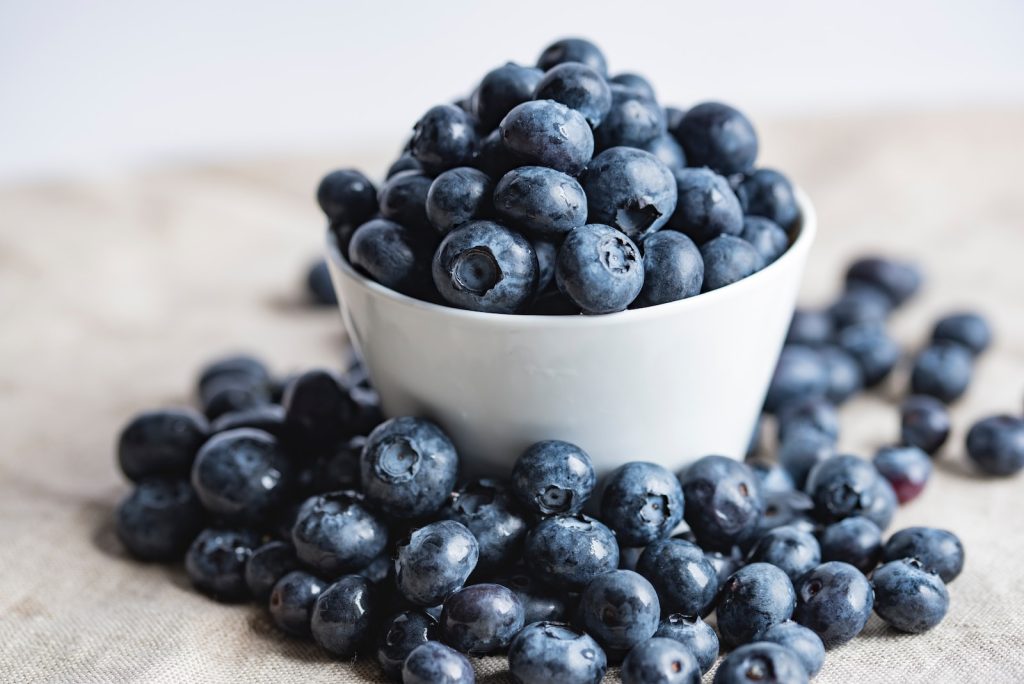Are you tired of feeling mentally sluggish and struggling with brain fog? Well, the solution to your problems may be found in a delicious and nutritious snack – blueberries. These small, blue fruits are packed with antioxidants that have been shown to enhance cognitive function, including memory and concentration.
Antioxidants are compounds that protect our cells from damage caused by free radicals, which are unstable molecules that can harm our bodies. Blueberries contain high levels of antioxidants, particularly flavonoids, which have been linked to improved brain function. Research has shown that consuming blueberries regularly can improve memory and cognitive performance in both children and adults.
So, if you’re looking for a natural and tasty way to beat brain fog and boost your cognitive function, consider adding blueberries to your diet. Whether you enjoy them fresh, frozen, or in a smoothie, these little superfoods have the potential to make a big impact on your mental clarity and overall well-being.
Understanding Brain Fog
Have you ever experienced a feeling of confusion or forgetfulness that makes it difficult to focus on tasks or remember important information? This phenomenon is known as brain fog, and it can be caused by a variety of factors, including stress, lack of sleep, poor nutrition, and certain medical conditions.
Brain fog can have a significant impact on your daily life, making it difficult to perform well at work or school, and interfering with your ability to enjoy leisure activities. Fortunately, there are steps you can take to reduce brain fog and improve your cognitive function.
One such step is incorporating blueberries into your diet. Blueberries are a rich source of antioxidants, which are compounds that help protect your cells from damage caused by free radicals. Free radicals are unstable molecules that can damage your brain cells and impair cognitive function.
The antioxidants in blueberries have been shown to have a positive effect on memory and concentration. In a study published in the Journal of Agricultural and Food Chemistry, researchers found that consuming blueberry juice improved cognitive function in older adults with mild cognitive impairment.
Another study published in the Journal of Nutrition found that consuming blueberries improved working memory in children and young adults. Working memory is the ability to hold and manipulate information in your mind over short periods of time.
In addition to their antioxidant content, blueberries are also a good source of fiber, vitamins, and minerals, making them a nutritious addition to any diet. So next time you’re feeling sluggish or forgetful, reach for a handful of blueberries to give your brain a boost.
The Power of Blueberries

Blueberries and Antioxidants
Blueberries are packed with antioxidants, which are compounds that protect your cells from damage caused by free radicals. Free radicals are unstable molecules that can harm your body’s cells and DNA, leading to various health problems, including cognitive decline.
Antioxidants in blueberries, such as flavonoids and anthocyanins, help prevent this damage by neutralizing free radicals. In fact, blueberries have one of the highest antioxidant capacities among all fruits and vegetables.
Blueberries and Cognitive Function
Studies have shown that the antioxidants in blueberries can enhance cognitive function, including memory and concentration. In one study, participants who consumed blueberry juice daily for 12 weeks showed improved memory and increased brain activity compared to those who drank a placebo.
Another study found that consuming blueberries improved cognitive function in older adults with mild cognitive impairment. The participants who consumed blueberries had improved memory and better access to words and concepts compared to the control group.
In addition to antioxidants, blueberries also contain other nutrients that are beneficial for brain health, such as vitamins C and K, fiber, and manganese.
Incorporating blueberries into your diet is an easy and delicious way to boost your cognitive function and protect your brain from age-related decline. Try adding them to your morning smoothie, oatmeal, or yogurt, or simply enjoy them as a healthy snack.
How Antioxidants Enhance Memory and Concentration
Blueberries are known for their high concentration of antioxidants, which can help improve cognitive function. Antioxidants work by protecting the brain from oxidative stress, which can damage cells and impair brain function.
One of the primary antioxidants found in blueberries is anthocyanin, which is responsible for the fruit’s deep blue color. Studies have shown that anthocyanin can improve memory and concentration by increasing blood flow to the brain and reducing inflammation.
In addition to anthocyanin, blueberries also contain other antioxidants such as vitamin C, vitamin E, and beta-carotene. These antioxidants work together to protect the brain from damage caused by free radicals and other harmful substances.
Research has also shown that blueberries can improve communication between brain cells, which can enhance memory and cognitive function. This is due to the high concentration of flavonoids found in blueberries, which have been shown to improve signaling pathways in the brain.
Incorporating blueberries into your diet can be an easy and delicious way to boost your cognitive function. You can add them to your morning oatmeal, blend them into a smoothie, or simply enjoy them as a snack. By consuming blueberries regularly, you may be able to improve your memory, concentration, and overall brain health.
The Role of Blueberries in Beating Brain Fog
If you’re looking for a way to boost your cognitive function and beat brain fog, look no further than blueberries. These delicious little berries are packed with antioxidants that have been shown to enhance memory and concentration. In this section, we’ll explore the role of blueberries in beating brain fog and how you can incorporate them into your diet.
Incorporating Blueberries into Your Diet
One of the best things about blueberries is how versatile they are. You can eat them on their own as a snack, add them to your breakfast cereal or oatmeal, or even use them in smoothies. Here are a few ideas for how to incorporate blueberries into your diet:
- Add a handful of blueberries to your morning bowl of oatmeal or yogurt
- Make a blueberry smoothie with almond milk, banana, and spinach
- Use blueberries in place of raisins in your favorite cookie recipe
- Make a blueberry sauce to top your pancakes or waffles
Scientific Studies Supporting Blueberries
Research has shown that blueberries contain a type of flavonoid called anthocyanins, which have been shown to improve cognitive function. One study published in the Journal of Agricultural and Food Chemistry found that older adults who consumed blueberry juice had improved memory and cognitive function compared to those who did not.
Another study published in the European Journal of Nutrition found that consuming blueberries improved both short-term and long-term memory in children. The study also found that blueberries improved mood and reduced symptoms of depression.
While more research is needed to fully understand the benefits of blueberries for cognitive function, these studies suggest that incorporating blueberries into your diet may help you beat brain fog and improve your overall cognitive function.
Conclusion

In conclusion, blueberries are an excellent source of antioxidants that can help boost your cognitive function. By improving blood flow to the brain and reducing inflammation, blueberries can enhance your memory and concentration.
Incorporating blueberries into your diet is easy and delicious. You can add them to your morning smoothie, oatmeal, or yogurt. You can also snack on them throughout the day or use them in baking recipes.
While blueberries are not a magic solution to beating brain fog, they are a tasty and healthy way to support your brain health. So next time you’re feeling mentally sluggish, reach for some blueberries and give your brain a boost!
Disclaimer: The information provided in this blog is for educational purposes only and is not intended as a substitute for professional medical advice. Always consult with your physician or another qualified healthcare provider before starting any new treatment or with any questions you may have regarding a medical condition. We also cannot guarantee the accuracy of the scientific studies mentioned.
David, a dedicated superfood enthusiast, has spent over a decade delving deep into the healing and rejuvenating powers of superfoods. With his vast knowledge, he passionately shares insights on how these natural wonders can optimize health and vitality for modern lifestyles.




